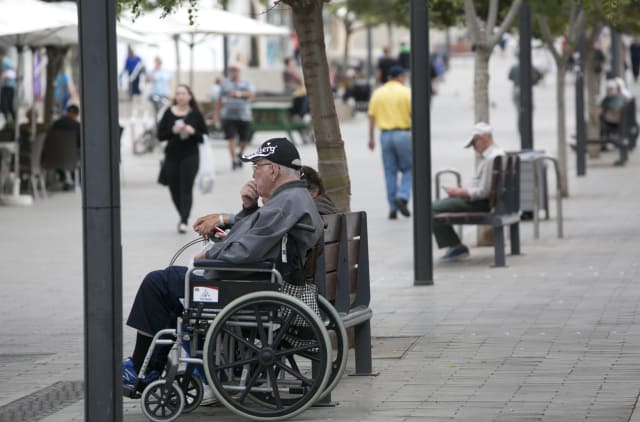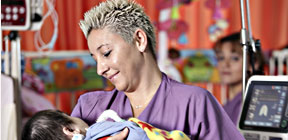
News from Israel: The shortage of Doctors
The shortage in doctors: Who will care for the thousands of patients in need of rehabilitation? By Dov Albukrek published in Ha’aretz – 06.12.18
The population is aging. The need for expert physicians in Rehabilitation and Geriatrics is expected to grow dramatically due to the rise in life expectancy.
Israel does not have a sufficient number of physicians specializing in rehabilitation and geriatrics, and patients are treated by medical teams that do not include a doctor. Dr. Dov Albukrek believes further deterioration in care is imminent and demands that the government give the issue high priority
Doctors are the engine that drives and pulls medical services, and they have a major impact on the quality of these services. Rehabilitation and Geriatrics are fascinating fields that rebuild the lives of patients and their families and improve their quality of life. But the image of these professions, however unjustifiably, lacks in glamor. Interns sometimes prefer to wait for specialization in one of the trendier fields of medicine, even losing a year or more of internship, rather than opt for rehabilitation or geriatrics.
These areas are thus defined as professions in distress, despite the fact that they are in very high demand today. Moreover, the need for specialists in these fields of medicine is expected to increase dramatically due to the constant rise in life expectancy: In 2030 the number of senior citizens in Israel is expected to reach 1.5 million – about 13% of the population. The forecast for 2065 is 17% - of a population double the size of Israel's current population. Even today, about one third of the patients in rehabilitation wards are over 65, and the number of those in need of rehabilitation is expected to grow with the ongoing rise of life expectancy.
The fields of Rehabilitation and Geriatrics are characterized by multi-professional work, in teams that include physicians, nurses, physiotherapists, occupational therapists, speech therapists, social workers, psychologists, nutritionists and others. Israel's Ministry of Health is working to increase the number of beds in the geographic periphery, while encouraging the Health Funds to introduce rehabilitation and geriatric services in patients' homes and in the community. However, there is no one to staff these services, and the Health Funds compete with each other and with the hospitals for the few physicians specialized in these fields.
This acute situation has generated some painful compromises, especially with regard to community and home care. Many patients currently receive rehabilitation and geriatric care without the involvement of expert physicians. At best, the few physicians available at the regional or national level are involved from afar. Medical decisions are made on the basis of consultation with distant doctors, who review medical documents without ever meeting the patient. Hospitals also experience a great shortage in rehabilitation and geriatric doctors, alongside substantial difficulty in recruiting good physicians to these high-demand areas, due to the highly challenging competition against much trendier fields like plastic surgery, dermatology and ophthalmology.
The small number of rehabilitation and geriatric physicians has forced the system to resort to a problematic solution: medical teams without doctors. Thus, new professions have been developed, designed to cut down the long and expensive training of medical experts. One such profession is the expert nurse who assumes more responsibilities. The advancement of such professions is in itself commendable, regardless of the physicians' crisis.
And yet, these solutions cannot replace the need for a specialized physician who determines treatment policies and leads their implementation. The situation in which medical care in Rehabilitation and Geriatrics is led by nurses, physiotherapists and other health professionals, as capable and dedicated as they may be, supported by physicians from afar, is most detrimental to the quality of care.
A certain change for the better was felt following the Incentives Program for professions in demand and the geographic periphery, implemented thanks to the government's 2011 agreement with Israeli physicians. The number of doctors joining the system annually doubled (about half had studied medicine in Israel, while the other half had graduated from institutions overseas), generating false hopes at the Ministries of Health and Finance – who had believed that the larger numbers of internship candidates would lead to the filling of intern positions in hospitals, including in Rehabilitation and Geriatrics, in both central Israel and the periphery, without the need for special incentives.
This approach led to a reduction in the incentives, and ultimately their complete cancellation – followed by their anticipated renewal. The health system saved millions of NIS, but Israeli citizens paid a very high price: only about 100 rehabilitation doctors and 300 geriatricians work in Israel today. In 2017 a single new rehabilitation expert was certified, joined in 2018 by six more. These numbers reflect the grave national shortage. Who will treat the thousands of patients who will require rehabilitation in the coming decades? Patients suffering the outcomes of strokes, traffic accidents, terror attacks?
If this issue is not properly addressed, the citizens of Israel will pay a heavy price - today, and even more so in the future. Adding internship positions – including internships in public hospitals that receive no support from the government - is not enough. The government must supplement this by creating attractive programs that will encourage high-quality physicians to specialize in Rehabilitation and Geriatrics.
The health system is powered by medical leadership. It must form a national program earmarking dozens of new internship positions for Rehabilitation and Geriatrics, while hospitals must present high-quality internship programs as a condition for receiving these positions. Substantial budgets must be allocated to Rehabilitation and Geriatrics interns all over Israel, with an additional incentive for interns in the geographic periphery.
Construction
and technological development are necessary but insufficient. The Ministries of
Health and Finance must think today of the critical and constantly growing
shortage in medical leaders in Rehabilitation and Geriatric Medicine and adapt
their policies and budgets to the rapidly changing reality.

